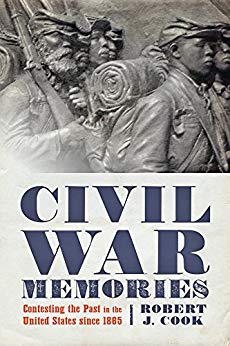Version française / Séminaires
- Libellé inconnu,
Séminaire de Politiques américaines/CENA (EHESS) - Robert Cook (Sussex)
Publié le 12 mars 2019
–
Mis à jour le 18 octobre 2021

Robert Cook (University of Sussex) présentera son dernier livre Civil War Memories: Contesting the Past in the United States since 1865 (Johns Hopkins University Press, 2017).
Date(s)
le 15 mars 2019
10h-12h
Lieu(x)
Centre d'histoire nord-américaine, Ecole des Hautes Etudes en Sciences Sociales (EHESS), 105 boulevard Raspail, 4e étage, salle 12.
Dans le cadre d'une séance spéciale du séminaire Politiques américaines coorganisée avec le Centre d'histoire nord-américaine (CENA) à l'EHESS, l'historien britannique Robert Cook (University of Sussex), spécialiste de l'histoire des Etats-Unis à l'époque de la Guerre de Sécession présentera son dernier livre Civil War Memories: Contesting the Past in the United States since 1865 (Johns Hopkins University Press, 2017).
At a cost of at least 800,000 lives, the Civil War preserved the Union, aborted the breakaway Confederacy, and liberated a race of slaves. Civil War Memories is the first comprehensive account of how and why Americans have selectively remembered, and forgotten, this watershed conflict since its conclusion in 1865. Drawing on an array of textual and visual sources as well as a wide range of modern scholarship on Civil War memory, Robert J. Cook charts the construction of four dominant narratives by the ordinary men and women, as well as the statesmen and generals, who lived through the struggle and its tumultuous aftermath.
Part One explains why the Yankee victors’ memory of the "War of the Rebellion" drove political conflict into the 1890s, then waned with the passing of the soldiers who had saved the republic. It also touches on the leading role southern white women played in the development of the racially segregated South’s "Lost Cause"; explores why, by the beginning of the twentieth century, the majority of Americans had embraced a powerful reconciliatory memory of the Civil War; and details the failed efforts to connect an emancipationist reading of the conflict to the fading cause of civil rights.
Part Two demonstrates the Civil War’s capacity to thrill twentieth-century Americans in movies such as The Birth of a Nation and Gone with the Wind. It also reveals the war’s vital connection to the black freedom struggle in the modern era. Finally, Cook argues that the massacre of African American parishioners in Charleston in June 2015 highlighted the continuing relevance of the Civil War by triggering intense nationwide controversy over the place of Confederate symbols in the United States.
Written in vigorous prose for a wide audience and designed to inform popular debate on the relevance of the Civil War to the racial politics of modern America, Civil War Memories is required reading for informed Americans today.
At a cost of at least 800,000 lives, the Civil War preserved the Union, aborted the breakaway Confederacy, and liberated a race of slaves. Civil War Memories is the first comprehensive account of how and why Americans have selectively remembered, and forgotten, this watershed conflict since its conclusion in 1865. Drawing on an array of textual and visual sources as well as a wide range of modern scholarship on Civil War memory, Robert J. Cook charts the construction of four dominant narratives by the ordinary men and women, as well as the statesmen and generals, who lived through the struggle and its tumultuous aftermath.
Part One explains why the Yankee victors’ memory of the "War of the Rebellion" drove political conflict into the 1890s, then waned with the passing of the soldiers who had saved the republic. It also touches on the leading role southern white women played in the development of the racially segregated South’s "Lost Cause"; explores why, by the beginning of the twentieth century, the majority of Americans had embraced a powerful reconciliatory memory of the Civil War; and details the failed efforts to connect an emancipationist reading of the conflict to the fading cause of civil rights.
Part Two demonstrates the Civil War’s capacity to thrill twentieth-century Americans in movies such as The Birth of a Nation and Gone with the Wind. It also reveals the war’s vital connection to the black freedom struggle in the modern era. Finally, Cook argues that the massacre of African American parishioners in Charleston in June 2015 highlighted the continuing relevance of the Civil War by triggering intense nationwide controversy over the place of Confederate symbols in the United States.
Written in vigorous prose for a wide audience and designed to inform popular debate on the relevance of the Civil War to the racial politics of modern America, Civil War Memories is required reading for informed Americans today.
Mis à jour le 18 octobre 2021












